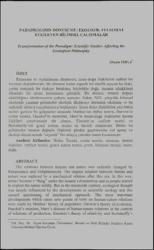| dc.contributor.author | İmga, Orçun | |
| dc.date | 2015-04-14 | |
| dc.date.accessioned | 2015-04-14T13:53:52Z | |
| dc.date.available | 2015-04-14T13:53:52Z | |
| dc.date.issued | 2010 | |
| dc.identifier.issn | 1302-1265 | |
| dc.identifier.uri | http://hdl.handle.net/11630/3830 | |
| dc.description.abstract | Rönesans ve Aydınlanma düşüncesi, insan-doğa ilişkilerini radikal bir biçimde değiştirmiştir.
Bu döneme kadar organik bir nitelik taşıyan bu ilişki, yerini mekanik bir ilişkiye bırakmış, böylelikle
doğa, insanın tahakkümü altındaki bir nesne konumuna gelmiştir. Bu durum, insanın doğayı
alabildiğine sömürmesinin yolunu açmıştır. Fakat, XIX. yüzyılda bilimsel ekolojide yaşanan
gelişmeler ekolojik düşünceyi derinden etkilemiş ve bu mekanik anlayış sorgulanmaya başlamıştır.
İnsan-doğa ilişkilerine yeni bakış açıları getiren bu gelişmeler arasında Malthus’un nüfus teorisi,
Darwin’in evrim teorisi, Haeckel’in monizmi, Marx’ın insan-doğa ilişkilerini üretim ilişkileri
çerçevesinde ele alması, Einstein’ın izafiyet teorisi ve Bertalanffy’nin genel sistem teorisi en önemli
olanlarıdır. Bütün bu gelişmeler insanın doğayla ilişkisini gözden geçirmesine yol açmış ve ekoloji
düşüncesinde “organik” bir anlayış yeniden önem kazanmıştır. | en_US |
| dc.description.abstract | The relations between human and nature was radically changed by Renaissance and
Enlightenment. The organic relation between human and nature was replaced by a mechanical relation
after this era. In this way, nature became a “thing” under the human’s domination and so people
started to exploit the nature wildly. But in the nineteenth century, ecological thought was deeply
influenced by the developments in scientific ecology and this caused questioning of mechanical
approach. The most important developments which cause new points of view on human-nature
relations were made by Malthus’ theory of population, Darwin’s theory of evolution, Haeckel’s
monism, Marx’s discuss of human-nature relations in the context of relations of production, Einstein’s
theory of relativity and Bertalanffy’s general system theory. All of these ideas urged human to
overview his relation with nature and distinguished the organic concept in human-nature relations
again. | en_US |
| dc.language.iso | tur | en_US |
| dc.publisher | Afyon Kocatepe Üniversitesi | en_US |
| dc.rights | info:eu-repo/semantics/openAccess | en_US |
| dc.subject | Nüfus Teorisi | en_US |
| dc.subject | Evrim Teorisi | en_US |
| dc.subject | Monizm | en_US |
| dc.subject | Üretim İlişkileri | en_US |
| dc.subject | İzafiyet Teorisi | en_US |
| dc.subject | Genel Sistem Teorisi | en_US |
| dc.subject | Çevre | en_US |
| dc.subject | Bilimsel Ekoloji | en_US |
| dc.subject | İnsan | en_US |
| dc.subject | Doğa | en_US |
| dc.title | Paradigmanın Dönüşümü: Ekolojik Felsefeyi Etkileyen Bilimsel Çalışmalar | en_US |
| dc.title.alternative | Transformation of the Paradigm: Scientific Studies Affecting the Ecological Philosophy | en_US |
| dc.type | article | en_US |
| dc.relation.journal | Sosyal Bilimler Dergisi | en_US |
| dc.department | Afyon Kocatepe Üniversitesi, İktisadi ve İdari Bilimler Fakültesi Kamu Yönetimi Bölümü | en_US |
| dc.identifier.volume | 11 | en_US |
| dc.identifier.startpage | 17 | en_US |
| dc.identifier.endpage | 29 | en_US |
| dc.identifier.issue | 2 | en_US |
| dc.relation.publicationcategory | Makale - Uluslararası Hakemli Dergi - Kurum Yayını | en_US |



















